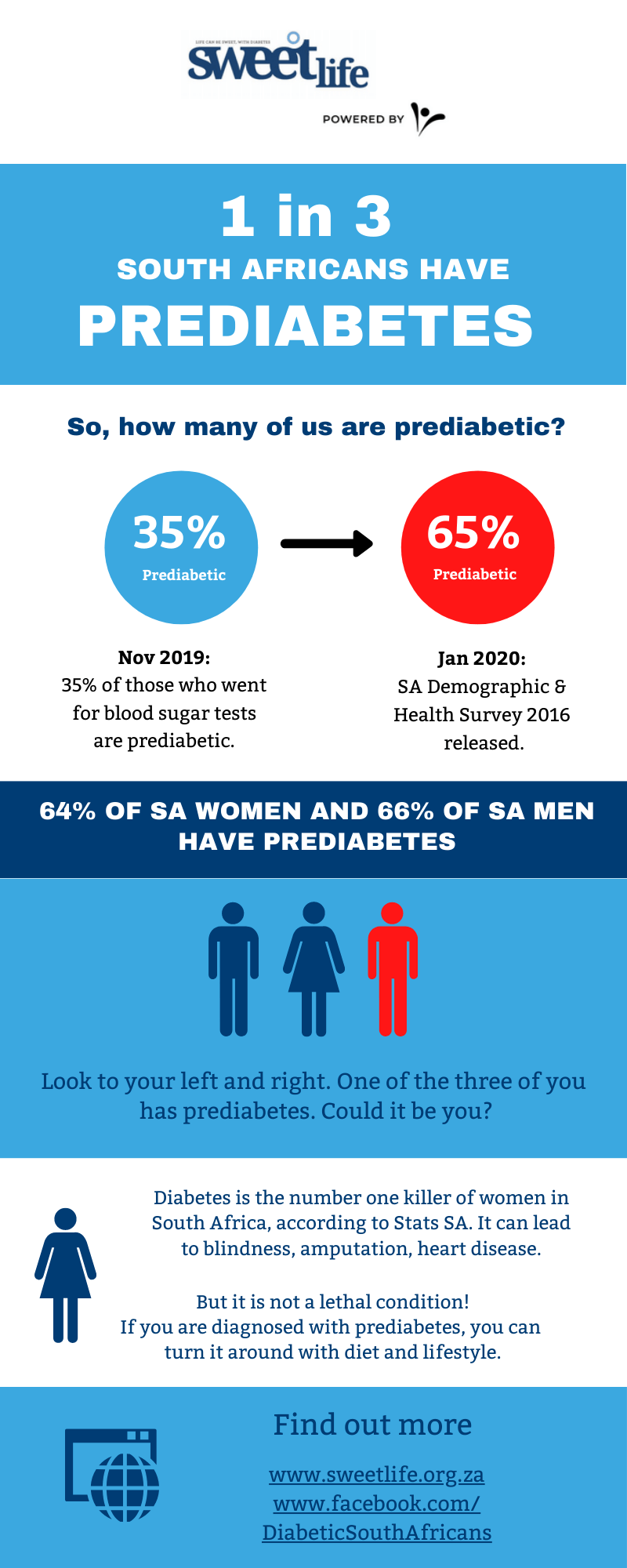The next epidemic is here already: here’s how to prepare
Drickus Maartens • June 2, 2020
One third of South Africans who tested their blood sugar have prediabetes. What does this mean? There’s still time to turn the diabetes epidemic around.
If there’s one thing the coronavirus pandemic is teaching us, it’s that we’re capable of making dramatic changes when we need to. As a nation, South Africans can unite to protect our health. But while COVID-19 presented as an immediate, loud threat, the next health epidemic is silent - and pervasive. Our next challenge is here, and it’s diabetes.
The diabetes epidemic in SA
Look at the person to your left and right on your next Zoom call. One of the three of you has prediabetes. You won’t see it as immediately as coronavirus, and there’s not nearly as much media hype around it, but the risks are very real - and very preventable. Diabetes is the number one killer of women in South Africa, according to Stats SA. It can lead to blindness, amputation, heart disease. But it’s not a lethal condition - not if you’re aware of it, and make a few simple changes.
⅓ of us are at risk for diabetes
Where do we get these numbers from? The people who took advantage of free blood glucose tests in National Diabetes Month (November 2019): 35% of them had abnormally high blood sugar, putting them in the prediabetic range - with an additional 5% testing as diabetic.
The recently released South Africa Demographic and Health Survey 2016
shows that these numbers are actually too low. They report that very high proportions of women (64%) and men (66%) are prediabetic (adjusted HbA1c level of 5.7%-6.4%). “Thus, a large proportion of adults are either not aware of their condition or not aware that they are at risk for diabetes.”
Diabetes and COVID-19
What makes this urgent is, of course, the fact that diabetes is a risk factor for COVID-19, and that the death rate is higher among those who have diabetes, obesity and hypertension. So the fact that at least a third of our population has prediabetes with no knowledge of it means that we are at greater risk of more serious COVID-19 cases.
What is prediabetes?
The World Health Organisation (WHO) considers blood glucose levels of below 5.5mmol/l to be normal: those of 7mmol/l and above are considered diabetic. Between these two cutoff points lies the prediabetic range: 5.5 to 7mmol/l. The good news? If you have prediabetes, you can make diet and lifestyle changes and bring blood sugar levels back to the normal range. This dramatically reduces the risk of developing Type 2 diabetes. But only if you know you have it!
According to WHO, 80% of cases of diabetes, 80% of heart disease and 40% of cancer could be prevented by avoiding tobacco, increasing physical activity and adopting a healthy diet. It is globally recognized that, in the case of NCDs (Non Communicable Diseases) and especially diabetes, prevention through lifestyle changes is critical and cost-effective
What this is, really, is a gift: advance warning that your body needs some help to prevent a chronic condition. We’ll provide further advice on how to turn prediabetes around next week.
Find out more about living well with diabetes by visiting Sweet Life on www.sweetlife.org.za
or Diabetic South Africans on Facebook.
More about the data:
During National Diabetes Month, a number of pharmacies like Clicks, Dis-Chem and AlphaPharm offer free blood glucose testing. We managed to get hold of the data through Allegra, who have created an entire health information exchange that completes the circle of care for all stakeholders like medical aids, insurance companies, pharmacies, pharmacy clinics - and patients. They’re all connected.
Allegra
empowered Sweet Life Diabetes Community, through their health information exchange, to get a picture of the extent of diabetes in SA and how we can act preventatively to minimize complications and unnecessary medical costs. The data was analysed by Percept, and we saw that of the 16,477 data sets (that had all the required data), 60% had normal blood sugar, 5% had measurements at the diabetic level and a staggering 35% had prediabetic readings.














